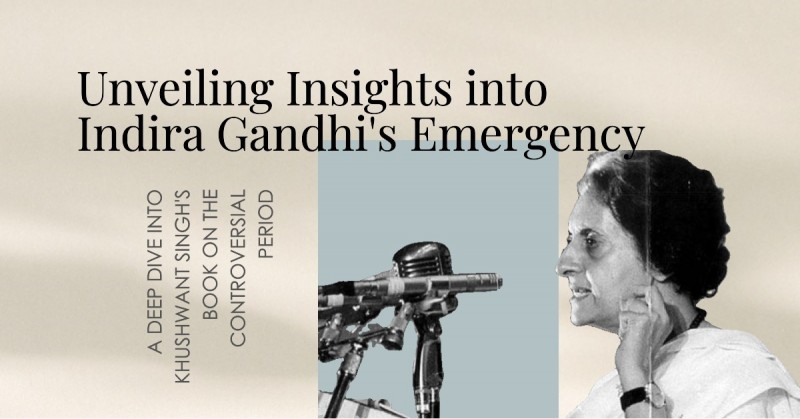
New Delhi: Former PM Indira Gandhi is called Iron Lady in the country, she also has an important contribution in the development of India. But, along with fame, Indira Gandhi's name was also associated with some big controversies. Then whether it is getting the saints and sages fired outside the parliament demanding ban on cow slaughter (1966), or even after releasing 90 thousand soldiers of Pakistan in the war of 1971, not taking back its 54 soldiers, Be it giving approval for the establishment of the Muslim Personal Law Board in 1973, or secretly adding the word secular in the Constitution in 1976, or his personal controversies from Oxford University to Gurudev Rabindranath's Shantiniketan. But, Indira Gandhi is criticized the most for the Emergency.
Date June 25, 1975 midnight, the then Prime Minister Indira Gandhi declared Emergency in the country. Even today, the stories of many atrocities committed by the government in this emergency keep appearing in the speeches of the leaders. But, why this emergency was imposed and who was the main character behind it, these questions are still a puzzle for many people. In fact, on June 12, 1975, the Allahabad High Court acquitted Indira Gandhi on 14 charges such as misusing government machinery, spending more than the prescribed limit, bribing voters and adopting unfair means to influence voters. Was ousted from the post of prime minister for six years. In fact, Socialist leader Rajnarayan had filed a petition in the Allahabad High Court in 1971 after being defeated by Indira Gandhi in the Rae Bareilly Lok Sabha seat. During the hearing on which the charges against Indira Gandhi had been proved and her Prime Minister's chair was about to go.
Also Read: Comparison of Rolls-Royce Phantom vs. Rolls-Royce Cullinan
Even, Indira Gandhi herself was about to resign from the post of PM. There were even reports that Indira had written her resignation, but even after the court declared her election illegal, Indira did not hand over the resignation till late night. Political experts say that the younger son Sanjay Gandhi was not in favor of his mother's resignation and he expressed his displeasure over it. In this uproar, the night deepened and everyone fell asleep. Then the next morning i.e. 26th June, when the eyes of the people opened and they read the newspapers and listened to the radio, it came to know that Indira Gandhi has declared an internal emergency in the country. This was the only option left with Indira Gandhi to save the prime minister's chair and keep power in her hands.
Renowned editor Khushwant Singh, who wrote the book Truth, Love and a Little Malice, has written the complete details of the imposition of Emergency on the country. Please tell that Khushwant had a good influence in the Gandhi family. He wrote in the book that Indira Gandhi was persuaded by the then Chief Minister of West Bengal, Siddharth Shankar Rai, not to resign from the post of Prime Minister. Khushwant writes that it was Rai who told Indira that now internal emergency was the only solution and then late at night the signature of the then President Fakhruddin Ali Ahmed was taken on the emergency order. The entire plan was kept so secret that the very next day after the order was issued, Indira took backdated signatures from the ministers in the cabinet meeting.
As soon as the Emergency was implemented, Indira Gandhi started putting opposition leaders in jail with the help of the police. Many veteran leaders including Atal Bihari Vajpayee, LK Advani, Madhu Limaye, George Fernandes were arrested on the night of 25th June itself. Not only this, Lalu Yadav, Nitish Kumar also had to go to jail for being allies in the JP movement. The Rashtriya Swayamsevak Sangh (RSS) was banned during the Emergency. Actually, the RSS was considered close to the opposition leaders and the government feared that the Sangh might protest against the government. After which the police jailed thousands of RSS workers. All of them were arrested under the MISA Act, which was called MISABANDI. Opposing this, Lalu Yadav named his daughter born on 22 May 1976 as Misa. At that time there were no TV news channels, In such a situation, censorship was implemented on newspapers. Every newspaper and every news was published only after the green signal from the government machinery. Khushwant Singh has written in his book that only Ramnath Goenka's newspaper Indian Express fought this censorship without fear. As a result, the electricity of the Indian Express office itself was cut off. The quota of that newsprint was also reduced. During this, a forced sterilization campaign was also run under the leadership of Indira Gandhi's son Sanjay Gandhi.
Also Read:Indian Cuisine: A Spicy Journey Through the Flavors of India
Explain that Emergency was implemented in India on 25 June 1975, which remained in force till 21 March 1977 i.e. 21 months. Meanwhile, all the elections across the country were postponed. Most of the rights of the people were taken away. Loknayak Jayaprakash Narayan called it 'the darkest period in Indian history'. In the meantime, so much atrocities were committed in the country by the government, that the public groaned, Indira Gandhi had also realized this. Seeing the growing wave of protests in her favor, Indira Gandhi recommended dissolving the Lok Sabha in March 1977 itself and holding fresh elections. It was here that the public completed its revenge, Indira herself lost the election from Rae Bareilly, the inviolable seat of the Gandhi family, and the Janata Party came to power at the Center with an absolute majority. This was a very important period of Indian politics, because after 30 years a non-Congress government was formed in the country and Morarji Desai became the PM.
Also Read:Tiger Shroff: The Dynamic Blend of Action, Dance, and Philanthropy